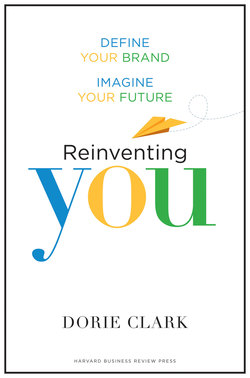Читать книгу Reinventing You - Dorie Clark - Страница 24
На сайте Литреса книга снята с продажи.
Your Behind-the-Scenes Research
ОглавлениеIn the pre-internet dark ages, it was almost impossible to decipher nontraditional career trajectories. How did she get a job like that? What kind of training did he have? Unless you knew them personally or were a reporter and could badger someone for a bio and press kit, you’d never know. Needless to say, some of the most exciting jobs don’t have a clear path.
But things are different these days. In the post-Google era, you can make massive research headway before even talking to a live person. I know one successful executive who’s made a habit of “stalking the biographies” of people he admires. The best way to get where they are, he decided, was to emulate them—exactly. From becoming a White House Fellow to developing a taste for marathons, he matched their regimen for success. Obsessive, yes, but he’s barely into his thirties, widely lauded in the media, and has already raised over $1 million for charity with his running.
Reading is, of course, another main research channel. You can take a page from Bill Gates who, as described by Steven Johnson in his excellent Where Good Ideas Come From, takes two weeklong “reading vacations” each year, where he plunges into the stack he’s been collecting. So save up your list of titles (from friends’ recommendations, reviews in industry magazines, or Amazon’s algorithms) and make sure you’re conversant with the leading books in your field before you start networking with people.
There are four immediate benefits. First, particularly if you’re diving into biographies or memoirs, you can get a better sense of whether or not a given field is for you (Michael Lewis’s Liar’s Poker, for instance, has given generations a taste of life on Wall Street). Second, your immersion will help you master the terminology; the jargon thicket can be dense in some fields, and you’ll want to sound credible. Third, you may pick up some fun anecdotes to share as you’re schmoozing, which can help you grease the wheels of social interaction.
Finally, you’ll be able to ask better, more-informed questions once you start meeting with other professionals to talk about your goals. Stein tells her clients, “If one of the things they’re exploring is being a lawyer, I don’t want them going to a lawyer and asking a dumb question like ‘What’s it like to be a lawyer?’” Executive coach Michael Melcher agrees: “You want to show that you’ve done your homework—that you’ve taken it as far as possible before talking with the person,” and urges people to consider the “highest and best use” of the person they’re interviewing. In other words, if you can find out certain information online or through books, don’t waste a professional’s time with it. You want to ask the person more sophisticated, refined questions (instead of “Where can I go for training?” think “I’d like your advice on choosing between two different revenue models”).
Try This
Make a list of the people you think are doing the most interesting things (anyone from famous business leaders to your neighbor who lived in Bangkok for a year).
Stalk their bios online. You can usually find them on the “about” page of their company’s website, but you may also have to do some detective work. If they’re well-known, read news articles to familiarize yourself with their career progression.
Identify patterns. If every person you admire is a Rotarian, maybe you should think about joining. If they all raise money to fight breast cancer, you can build a solid network by pitching in.
Brainstorm a tentative list of goals, based on your idols. You can refine them later (and we’ll work together to figure out the “how”). But now’s the time to think big: visiting at least fifty countries, getting your own radio talk show, raising a million dollars for charity, being named partner, or whatever most appeals to you.
